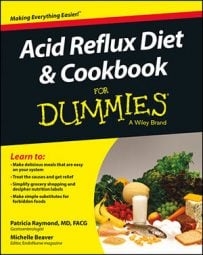If you’ve been vocal about your acid reflux, you’ve heard it all by now. Loved ones and complete strangers have probably offered advice and information. Some of it may be true, and some of it may be myth. How do you know for sure? Following are 10 myths about acid reflux debunked.
The heart is what causes heartburn
“Heartburn.” What a misnomer. Heartburn has nothing to do with the heart, except that the chest (which, of course, houses the heart) is the general location where people with acid reflux feel discomfort. But the condition of the heart has nothing to do with whether someone suffers from acid reflux.
Acid reflux kills bad breath
Some people think that the acid that shoots up your esophagus kills bad-breath germs. Nope. Acid reflux can make the condition worse.
Heartburn is no big deal
Heartburn is common. More than 60 million Americans experience heartburn or other reflux symptoms at least once a month. About 30 percent of Americans have chronic acid reflux or gastroesophageal reflux disease (GERD). That’s a lot of people.
But just because the condition is common doesn’t mean you shouldn’t worry about it. Acid reflux should be taken seriously. First, it’s uncomfortable, if not outright painful. It can cause missed sleep, make you cranky, and lead to GERD. And what can GERD lead to? Barrett’s esophagus. And what can Barrett’s esophagus lead to? That’s right, esophageal cancer.
Acid reflux is no big deal if you have it a couple times a year. The more often you get it though, and the more severe it is, the more you need to worry about it. So, is acid reflux a big deal? Yes, it is.
Prescription drugs for acid reflux hurt the digestion process
Some drugs for heartburn and reflux reduce the amount of acid people have in their stomachs. Acid is a vital part of the digestion process, which is why some people wonder if taking medicine that reduces acid will hurt digestion. No fear, though: The stomach keeps producing enough acid for digestion.
Gastroesophageal reflux disease always leads to cancer
GERD can lead to Barrett’s esophagus, and Barrett’s esophagus can lead to esophageal cancer. The keyword is can. If you have GERD, you’re not destined to develop Barrett’s esophagus, and if you have Barrett’s esophagus, you’re not destined to develop cancer.
Only between 5 percent and 10 percent of GERD patients develop Barrett’s esophagus. And only 0.5 percent of Barrett’s esophagus patients develop esophageal cancer per year.
Only unhealthy people get acid reflux
You have to be obese, have muscle atrophy, and cataracts and be an alcoholic to get acid reflux, right? Nope!
Otherwise completely healthy people can get acid reflux regularly. Now, people who are unhealthy in certain ways (smokers, frequent drinkers, and so on) are more likely to develop acid reflux, but totally healthy people can develop it, too. Athletes get it, yoga teachers get it, nutritionists get it.
If you have certain habits, you can get acid reflux, even if you’re at a perfect weight, eat well, and exercise regularly.
Heartburn is just part of the aging process
Not so. Yes, the digestion process does slow down as you age, and that slowdown can make someone a little more likely to suffer from acid reflux, but that doesn’t mean that seniors are destined to get it. As at any other age, diet and lifestyle changes can minimize your chances of developing reflux. Acid reflux is not inevitable just because you’re a certain age.
Over-the-counter antacids aren’t real medicine
Over-the-counter acid-reflux pills don’t require a prescription, but they’re still a medicine, and they do have side effects. Some people pop antacids like candy, but no one should do that. Read the instructions for use and follow them. Antacids are some of the most common and best-selling drugs in the world because they provide comfort in many cases.
However, they do not cure acid reflux and abuse of them can cause side effects like the following:
Loss of appetite
Excessive tiredness
Weakness
Diarrhea
Muscle pain
Swelling
Kidney stones
Liver damage
Senility
Memory loss
Dementia
If you fear you’re ingesting too many antacids, contact your doctor immediately for consultation, and be honest about exactly what kind of antacid you take, how many antacids you’re taking, and when.
It doesn’t matter what side of your body you sleep on
Some people swear that it doesn’t matter which side they sleep on. However, if you’re prone to acid reflux at night, you should lie on your left side. The digestive tract runs in such a way that lying on your left side makes acid reflux much less likely. See, the stomach is located to the left of the esophagus, which makes it hard for acid to flow out of the stomach and into the esophagus. Lie on your right side and you’re more likely to get acid reflux.
In this case, right is wrong.
Drinking decaffeinated coffee won’t aggravate your acid reflux
Not so. It’s the oil in the beans (caffeinated or non) that can cause reflux. So, whether caffeinated or decaf or half-caff, that cup of coffee may cause you problems. Now, if you aren’t bothered by any type of coffee, you’re okay here and can drink caffeinated or decaf, whatever your preference.

